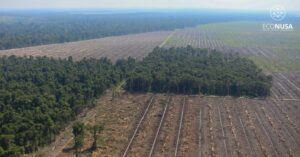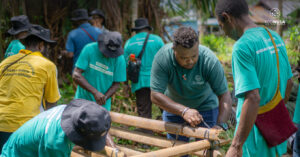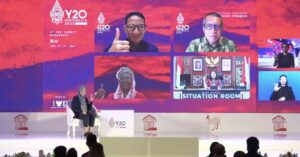
Sluggish economy due to Covid-19 pandemic has caused more restricted access of most peoples to food. Data from Food and Agriculture Organization (FAO) shows that Covid-19 outbreak has made nearly 690 million peoples in the world suffer from famine. The figure has increased by 10 million from the 2019 data which might add another surge depending on the world economic growth condition.
Responding to the impact of pandemic to food resilience particularly of the eastern Indonesia, EcoNusa Foundation jointly with PakaTiva commits to help bolster food resilience among the coastal communities and those dwelling in some islets in South Halmahera. The commitment was implemented through Forest community Work program and EcoNusa Maluku Expedition Route 1. This expedition provided various kinds of supports such as farming tools, fertilizer and horticulture plant seeds to the visited villages. These villages include Samo, Posi-posi, Gumira and Pasir Putih in which PakaTiva provides its assistance.
Formerly, villagers in Samo, Posi-posi, Gumira and Pasir Putih often make use of the existing food resources. Sago, cassava (kasbi), sweet potato (batata), and corn are their daily staple food in these four villages. However, modernization has made villagers habit of traditional food consumption fade away. It goes along with the mushrooming modern food and the mounting dependence of local community to rice. As a result, local people has left the consumption of sago, cassava, sweet potato and rice. Such condition has tarnished the local food resilience.
“In 1980s, there was timber company, PT. Barito, coming here. It was the beginning when peoples seemed to forget because they had new assumption that the company could help ease their livelihood. But, as long as the company exists here, the community welfare has never improved,” said Rusli Hi Aba, Samo Village head, sharing his story about the time when the community shifted from traditional food.
Through Forest Community Work program, PakaTiva provided assistance to the communities in these four villages to boost up the local wisdom-based forest management system through community economic development and environmental management. PakaTiva believed that when the community has prosperous life with benefit from the forests in their villages, they will be completely aware to maintain the existing forest ecosystem. For the reason, food independence system should be incessantly built in these villages.
PakaTiva has assisted Samo Village since 2019 and started to give a hand to Posi-posi, Gumira and Pasir Putih Villages in 2020. The support is given through capacity development and training on organic local farming by cultivating the existing land and resources potentials. The communities are called to cultivate their land by planting paddy, tubers, vegetables and fruits. The organization also shares their knowledge on agriculture product management so as to give economic value. For instance, making virgin coconut oil, halua (palm sugar processed with walnuts and cassava) and banana crisp.
“The support from EcoNusa since 2019 for the PakaTiva’s Forest Community Work program has helped the communities in these four villages to restore their local tradition and culture in farming governance. The lost pattern of sustainable land and forests utilization has been restored bit by bit. One of them is by cutting of the community dependence on rice and urging them to plant their own paddy,” said Faisal Ratuela, PakaTiva Director.
The presence of PakaTiva and EcoNusa in these four villages got warm welcome. Husein Adam, a villager of Samo and coordinator of farmer group, said that the community felt grateful for the helpful assistance. In addition to delivering a better land management, PakaTiva also called people to process their farming products so as to provide higher economic value. They also help channel the marketing of the local products.
“We have got many benefits when PakaTiva comes here. We now understand how to look after plant, make organic fertilizer. We used to plant without any fertilizer. Just water it, that is all. Formerly if we wanted to eat, should afford the food to transmigrant. But now we just go to our garden to take we want for our meal,” said Mama Salma, a local villager of Gumira.
Editor: Leo Wahyudi & V. Arnila Wulandani







